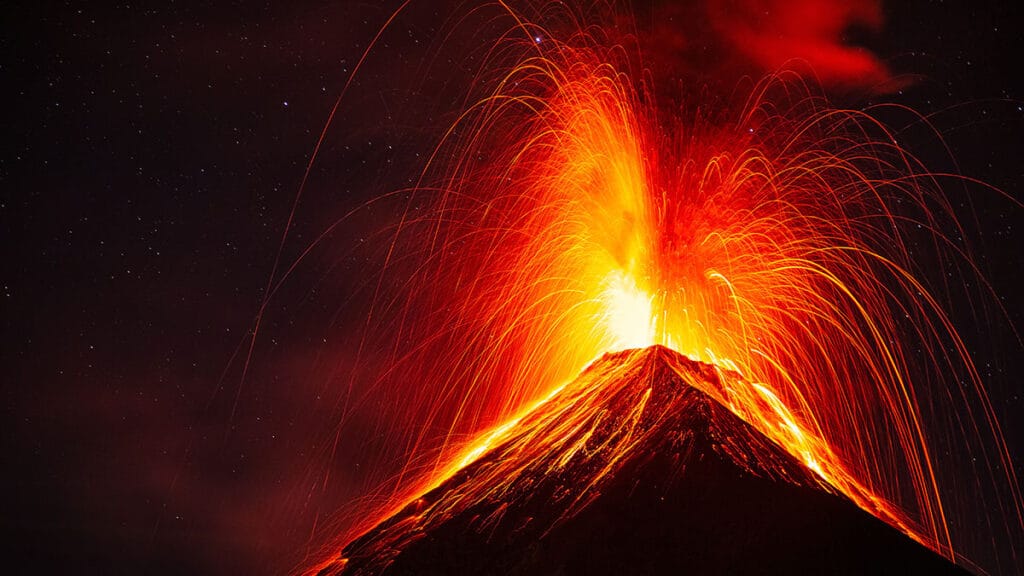Aggayú Solá is the Cuban Yoruba orisha of powerful flowing forces of nature that create land such as: volcanic lava flows and raging rivers. In some traditions, he is also the orisha of deserts which are flowing rivers of sand. In the Yoruba language, his name means “voice of the desert.” Given the extremes of climate change, this is a good time to honor him.
African Diasporic religions are beautiful, highly developed faiths that are the equal of any other religion. In the Americas, they are mixed with the colonizer’s Catholicism. These are oral traditions that vary by continent, region, country, city, community, and even by family. Americans are most familiar with Cuban Yoruba traditions, but Beninese Vodun, Haitian Vodou, Dominican Vudú, New Orleanian Voodoo, Cuban Palo, and Brazilian Candomblé or Umbanda are all related to the Yoruba, Dahomey, and Kongo traditions of Mother Africa. And in Cuba, what we call Yoruba has absorbed Dahomey and Kongo traditions. A few particular rhythms and dances remain, but most people don’t know the difference.
Aggayú Solá

Unless you are in a trance state, you won’t interact with the orishas directly, but you may recognize signs of their energies in and around your life. You may also use symbols to call their energies into your life.
Aggayú Solá manifests in nature as volcanoes, raging rivers or deserts. As a person, he manifests as the ferryman, hence his syncretization with Saint Christopher, the Catholic patron saint of travelers known for carrying people across rivers.
Aggayú’s number is 9 and multiples of 9. The color of his eleke (beaded necklace) is brown with nine different colors but no black. He uses a double axe (like Changó) and a staff. He can be grouchy, but is also a protective father who loves children.
You don’t want him to be angry with you because he can explode with volcanic eruptions, flash floods, tidal waves, and sand storms.
Most orishas have multiple roads or dominant characteristics, but Aggayú Solá has only one.
Aggayú is often said to be the father or brother of Changó, the orisha of drumming, dancing, thunder, fire, manhood and leadership. There may be a mature man/young man relationship between the two, similar to the mature woman/young woman relationship between Yemayá and Oshún. The mature man builds things, while the young man looks for fun. The mature woman takes care of her children, while the young woman is self-possessed by her beauty.
There Are No Volcanoes in Cuba
Nobody knows how Agayyú Sola got associated with volcanoes because there are none in Cuba or African Yorubaland, although Mount Cameroon is not far from Yorubaland.
A possible association comes from the Lesser Antilles which are volcanic islands. The Atlantic trade winds and currents flow directly from far West Africa to the Lesser Antilles. In the Kongo culture of Central Africa the Kalûnga (Atlantic Ocean) separates the living and the dead. Kongolese knew that those who ventured out into the Atlantic never returned. It was considered a voyage to the land of the dead.
Imagine the terror of being kidnapped, abused, and believing you were being taken to your death. But it turns out there was life on the other side of the Kalûnga. The great flowing wind and waves brought the Africans to the volcanic islands of the Lesser Antilles. This would have been taken as a sign of deliverance. It also fits well with the syncretization of Aggayú Sola with Saint Christopher who is known for carrying people across the water.
We Are a Mix of Traditions
African Diaspora traditions in the Caribbean and Latin America come from the Dahomey, Yoruba, and Kongo cultures that blended together and rooted in the Americas since the Colonial Era. The traditions are both unique and related – even in Africa. American audiences are most familiar with Cuban Yoruba traditions. Today, these are a blend of many legacy traditions using the Yoruba pantheon as the common language.
| AMERICAS | FAITH | COLONIZER | CULTURE | MOTHER AFRICA |
| Cuba | Lucumí (Santería) | Spain | Yoruba | Nigeria |
| Haiti New Orleans Cuba | Vodun Voodoo Palo | France France Spain | Dahomey (Fon) | Benin & Central Africa Benin & Central Africa Benin & Central Africa |
| Brazil | Candomblé | Portugal | Kongo | Central Africa |
There are actually many traditions both in Africa and the Americas, but these are the most popular ones. In the Americas, these traditions are blended with the colonizer faith, Catholicism and that is how most of us know them. In the Colonial Era, the African Diaspora was not allowed to celebrate its own traditions, so African traditions were hidden inside Catholic traditions.
Notice that there are no English or Dutch colonizer equivalents. Protestants feared the drum and banned it. Catholics allowed interracial marriage, probably because Spain and Portugal are already mixes of many cultures. English and Dutch Protestants preached and practiced complete separation (at least in public), though the men separated from their own wives at night.
In any case, the African Diaspora traditions are beautiful faiths based on plant medicine and the forces of nature which are universal. They are living traditions.
